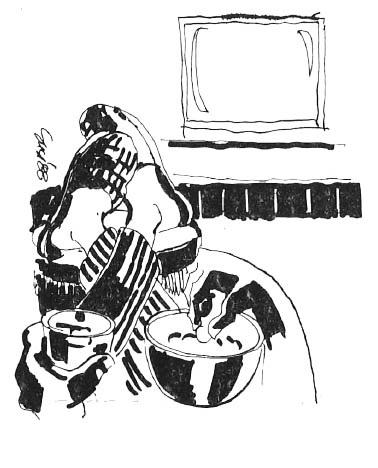
Reading the news the other day that business for Athenian movie theatres was so bad some of them were to be converted to furniture stores and supermarkets I can’t say I’ll be sorry to see them go. Up to the advent of the VCR they were a necessary evil for an avid movie fan like myself; but now that I can sprawl in an armchair or relax on my bed with a highball in one hand and a bowl of macadamia nuts within easy reach of the other, and watch any movie that takes my fancy from the plethora of titles available, it takes something very special to make me undergo the ordeal of attending a performance at an indoor cinema in Athens.

Fortunately, my childhood and early teens were spent in Alexandria, Egypt where the cinemas were plentiful and offered a full bill which started at set hours – 3:30, 6:30 and 9:30 pm with numbered seats you could book in advance. They also had large loges, in which a party or family of five or six could sit in comfortable proximity to each other and in splendid isolation from lesser mortals.
The lavish bill usually began with a cartoon , followed by a short feature on sports (remember Grantland Rice?); or a comedy feature by Pete Smith, Robert Benchley and others; or a musical short featuring Spike Jones and his City Slickers, Borrah Minevitch and his Harmonica Rascals or some big-name band. Then came the newsreel (Fox Movietone, Paramount, Gaumont or Pathe) and an interval before the main feature during which a white-coated attendant would move up and down the aisles with a tray loaded with ice cream and candy. At one cinema this function as performed by a small, round-shouldered Greek who would tout his wares by crying out in a sad and· mournful voice: “Chocolat, Eskimo, Minteeps!” the chocolat pronounced as in French, the Eskimo being the local equivalent of an Eskimo Pie and the Mintips being a brand of chewy, mint-flavored candy.
When the British troops arrived in Egypt at the beginning of Word War II the vendor discovered he could raise a laugh by adding the phrase, “Good for stomach!” to his spiel.
French being the Lingua franca of Alexandria at the time, English – speaking movies had French subtitles and, as a concession to the native Egyptian population and the large Greek community, subtitles in Arabic and Greek were also projected dimly into a small screen at the side of the big one. These subtitles were moved by hand to follow the action and more often than not the projectionist would forget himself and lag behind considerably whereupon the Greek and Arabic subtitles would suddenly flash by at an unreadable speed until they caught up with the action on the big screen.
The cinemas were large and airy, with comfortable seats and plenty of legroom and, with the exception of one open – air cinema on the grounds of the San Stefano Casino, they were all indoor movie theatres which stayed open all year. Just before the war, the Rio cinema built a summer roof garden cinema on the top of their regular theatre and, from my bedroom window in a seventh-story apartment two. blocks away, I could see half the screen but w hear the sound track only when the wind was blowing from the southwest.
Of the many movies I half-saw in this way I particularly remember On the Avenue with Dick Powell, Madeleine Carroll, and Alice Faye, which ran for two weeks with a steady sou’wester blowing all the time and I can still recall the words and tunes of “I’ve got my love to keep me warm” and “This year’s kisses” which were the best of the songs written for that musical by Irving Berlin.
It was in this context that my movie going career began at the age of seven or or eight as a regular Saturday-afternoon treat. My parents being unwilling to forgo their afternoon siesta, I was taken to the cinema by our one-eyed Armenian maid who had been rescued from genocide in Anatolia as a little girl in 1915 by the American Near East Foundation and reared in an orphanage in Egypt until she could earn her living in domestic service.
Her favorite actor was Conrad Nagel but if he ever starred in a picture showing during her five years with us she never got to see it with me, my tastes running more to such movies as Tarzan the Ape Man and all the subsequent Tarzan pictures with Johnny Weissmuller and Maureen O’Hara; Captain Blood and the Sea Hawk with Errol Flynn; all the Charlie Chaplin and Laurel and Hardy films and, of course, the Marx Brothers who were my special favorites. When none of these was showing, I had to make do with the Andy Hardy series, the Warner Brothers gangster movies and Deanna Durbin musicals.
When I first came to Greece after the war I was appalled to find there was no bill to speak of other than an abominable newsreel produced by the Greek press ministry followed by the main feature. On the rare occasions that a cartoon was shown there was an invariable gasp of pleasure from the audience. I guess the paucity of the bill was dictated by reasons of economy and to allow the exhibitor to crowd as many as four or five shows into the space of one day.
The seats were generally uncomfortable with very little legroom and if the theatre was crowded one was likely to be assailed by particularly powerful wafts of b.o. from one side, of decomposing socks from another and lethal puffs of garlicky breath every time the person behind you opened his mouth.
I got my own back on my stinky fellow movie-goers one day some years later when just before going to a movie I had to fix a leaking oil burner in my basement and stepped in a small puddle of gas oil. While I was sitting in the crowded cinema I was pleased to see the couple in front of me get up and move somewhere else. A little while later the people on either side of me also moved away and then another three people sitting behind me rose silently and disappeared from view, leaving me gloriously surrounded by empty seats. As I pondered this extraordinary stroke of good luck I caught a whiff of gas oil from my shoes and realized that it was I who had driven everybody away.
The other thing that annoyed me was the beefy lady at the gate who stood there with a flashlight in one hand and pile of leaflets (the programma) in the other. Woe betide you if you failed to cross her palm with silver, and if you managed to slip by her and tried to enter the darkened auditorium without a programma in your hand, you were immediately pounced upon by her equally burly sidekick lurking inside, who blinded you with her flashlight and claimed her due. If, after forking out a suitable sum, you asked her to show you to an empty seat she would wave her flashlight vaguely down the aisle and snap: “Sit anywhere you like” as she put the bite on the next customer coming in sans programma.
In the days when the same movie used to be shown in all Athenian cinemas during the same week, the exhibitor saved money by using only one copy of the film. When the first reel was shown at the first cinema, it would be whipped off the projector, packed in its can and sent to the next movie house via a boy on a bicycle while the second reel was showing qt the first cinema. The starting time of the performance at the second cinema depended entirely on how fast the boy could pedal across town from the first theatre and v~ry often he might get caught in a traffic jam between the second and third reel and the audience at the second or third cinema would have to sit through a very extended intermission.
On the night of the Polytechnic troubles in 1973, I was watching a movie at the Athinaion cinema in Ambelokipi and the boy who was to bring the third reel from the Orpheus at the bottom of Stadiou Street couldn’t get past the tanks. After a 45-minute wait the theatre manager gave up and sent us home, stamping our tickets to make them valid for a more propitious performance with unobstructed cinema-to-cinema communication.
So now that I can watch movies in the comfort of my home I couldn’t care less if Athenian movie theatres become furniture stores or supermarkets and I am sure that with a little training, the usherettes will easily take to shifting heavy dining room sets or toting beef carcasses from the freezer to the meat counter.







